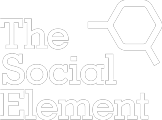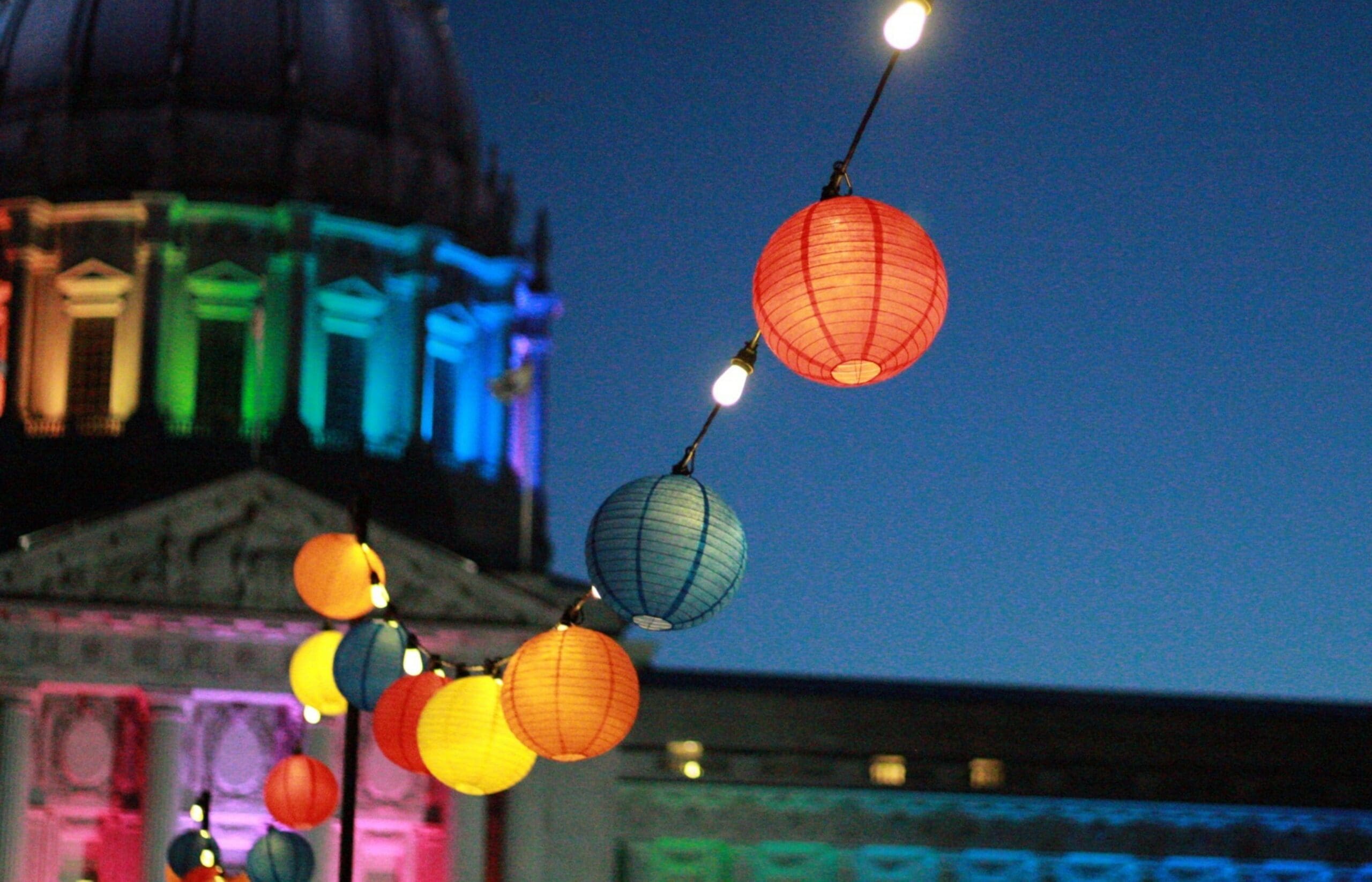You’ve probably heard of Greenwashing, but have you heard of Rainbow Washing? According to the Collins dictionary, Rainbow washing is “a superficial or insincere display of concern for LGTBQ+ rights that is shown by an organization”. Basically, you talk the talk, but is your brand walking the walk? Most likely not.
We’ve seen brands like Target and Bud Light receive a lot of backlash in the US for their recent Pride campaigns and ultimately backing down, so we were keen to look at how brands across Europe are approaching Pride and what the response has been.
It’s important to know when to speak up, when to pass the mic and when to simply be quiet.
Many brands choose to publicly support Pride and the LGBTQIA+ community, but we know that they don’t always get it right. Simply sticking a Pride flag on your product isn’t going to cut it, so how can your brand be a genuine ally to the LGBTQIA+ community and what do consumers really want to see?
A whopping 74% of consumers in the UK believe that brands should be supporting the LGBTQIA+ community all year round, not just in June, yet most people say they’ve not seen any brands engage with LGBTQIA+ initiatives outside of Pride month. If your brand has remained quiet on LGBTQIA+ issues throughout the year and then suddenly creates a plethora of Pride-themed content in June, it may seem insincere.
When is it appropriate for brands to support LGBTQIA+ causes? (Source GWI 2022)
Over 30% of people in the UK said they want to see brands teach their audience about LGBTQIA+ issues and challenge misconceptions this Pride month. They want to see more positive representation of the community, to counter the negative stories which often fill the mainstream media. Using your brand’s platform to pass the mic and spotlight people within the community can be incredibly powerful. However, if you’re giving someone a platform to share their lived experience, it’s vital that you have moderators in place to monitor the comments and ensure that your social media is a safe space. Showing your support for the community means nothing if you’re not protecting them in the comment section.
What consumers don’t want to see is brands sharing a simple post for Pride or changing their branding without taking meaningful action alongside this, like educating your audience and donating to LGBTQIA+ organisations.
If you’ve missed the mark this month, don’t wait till June 2024 to try again. When it comes to brands supporting the LGBTQIA+ community, consumers want brands to have inclusive advertising year-round (30%), create an inclusive workplace culture that supports LGBTQIA+ employees (27%), and make efforts to influence positive change for the community (27%), whether that’s through activism or by donating to organisations that are already doing incredible work. Becoming an ally doesn’t happen overnight, and it requires a long term commitment and a willingness to learn.
But what actually happens when a brand speaks up?
Loudly and proudly supporting the LGBTQIA+ community, or any marginalised community for that matter, may result in backlash for your brand, but it’s important to remember that this is nothing in comparison to the stigma and violence that individuals within that community face on a daily basis.
While society has come on leaps and bounds, there is still a lot of homophobia and transphobia that exists, especially on social media where people can hide behind an anonymous account. Brands all have their own unique ways of dealing with these instances – whether it’s hiding comments, ignoring them, or choosing to be brave and challenge them.
1. UK
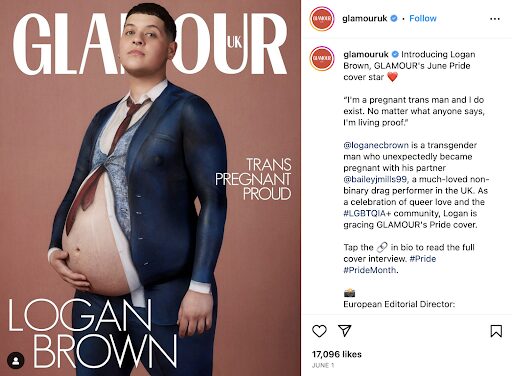
Glamour UK kicked off Pride month by interviewing and featuring Logan Brown, a writer and children’s support worker from England, on its June cover. The story was quick to garner attention, as Logan is a trans man who unexpectedly fell pregnant last year and has faced a lot of transphobia throughout his journey. While many social media users were grateful for his honesty and this much-needed representation, Glamour received significantly more negative mentions, than positive, in the initial days following publication.
Glamour made the decision to retroactively turn comments off on the respective Instagram and Facebook posts, but this is not an option on Twitter. This resulted in an influx of transphobic replies under the original tweet, as well as indirect negative mentions from celebrities and the average consumer alike.
Glamour chose not to engage with the negativity, and the spike in negative comments quickly died down, returning to normal levels within a week of posting. While this initial negativity was very loud, we have to acknowledge the positive impact it had as well. It meant a lot to the LGBTQIA+ community to see a story like Logan’s being shared by such an influential magazine. Choosing to stand its ground and keep Logan’s story public, Glamour proved itself to be a real ally to the LGBTQIA+ community.
Deborah Joseph, Glamour’s European Editorial Director, said: “Logan and his partner Bailey bringing their beautiful baby into the world is a story of love and acceptance; things that we are sadly often reminded that the world could use a little more of.” We couldn’t have said it better ourselves.
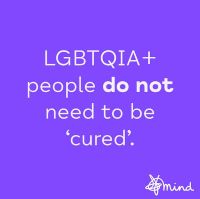
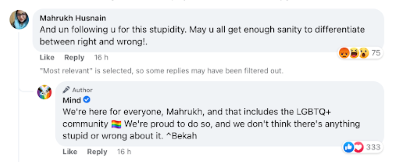
Mind is a great example of a brand who are active allies all year round, not just during Pride month. It acknowledges and offers support to the LGBTQIA+ community on days like Trans Day of Visibility and International Day Against Homophobia, Biphobia and Transphobia, but its team is also there for the community on all the days in between. Its content surrounding the LGBTQIA+ community generally performs very well, but with increased traffic and engagement, also comes increased negativity.
The mental health charity takes a more bold approach when it comes to moderating the comments. It has strict social media guidelines in place and will hide anything that is discriminatory or could be damaging to someone’s mental health. This means the majority of homophobic and transphobic comments will be hidden, however Mind also doesn’t shy away from challenging users and educating them where appropriate. Members of the LGBTQIA+ community often have to defend themselves, so it means a lot for an organisation like Mind to stand its ground and stand up for them. According to Portland Communications, the majority of people in the UK under the age of 60 believe it’s important to fight discrimination against LGBTQIA+ people, so it’s clear Mind is doing right by them.
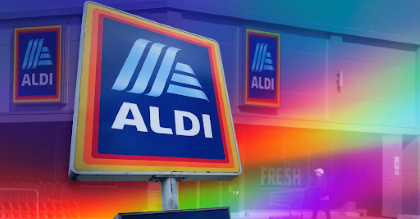
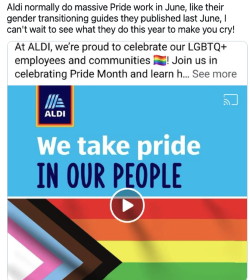
Aldi is always vocal during Pride month, so it’s no surprise that it experienced a spike in traffic at the start of this month. There was a significant increase in negative sentiment on June 1st, fueled by a British celebrity who is known for their backwards views. Ironically, this negative post led to an increase in positive mentions of the brand. Aldi did not engage with the negativity at all, but its loyal fanbase did. Social media users were quick to share their admiration for the brand and the work it does to support the LGBTQIA+ community, from sponsoring Pride parades to providing support to trans employees and training managers to be better allies.
This is a good reminder that it’s not always necessary to intervene, especially if you have a good reputation and have built a dedicated audience who are willing to stand up for you. Aldi may not overtly challenge homophobia and transphobia on their social media, but it demonstrates allyship year-round through a strong Diversity and Inclusion policy and ongoing support for the LGBTQIA+ community, both online and offline.
2. Spain
In Spain, Absolut Vodka has released a campaign in partnership with Netflix’s Pakita Salas super star Brays Efe, in partnership with streaming service Movistar+, featuring a non-traditional family.
The campaign has received very diverse responses, with comments on Instagram being very enthusiastic and supportive, while Twitter showcased the more toxic side of social media. Choosing the correct medium for the campaign is always an important step to consider. Your content calendar doesn’t necessarily need to look the same for all channels.

Absolut is an ally all year round , posting to raise awareness not only on Pride month, but also having inclusive advertising all year round, from reminding its audience that everyone deserves love on Valentine’s Day, to having a Drag Queen as a brand ambassador.
Absolut’s strategy (on Twitter, at least) is to ignore the negative comments, but it does engage with its community when people are being positive or asking questions about the brand’s Pride campaigns.
Another brand doing great things in Spain is J&B, an alcohol brand that is an ally all year round. Its entire Instagram grid this month is a celebration of queer joy, including the campaign “Orgullo Pueblo” (Small Town Pride”), which is bringing Pride celebrations to small towns all across Spain. This is such a stellar example of listening to the community and adding value, instead of merely sticking a rainbow on packaging for profit.
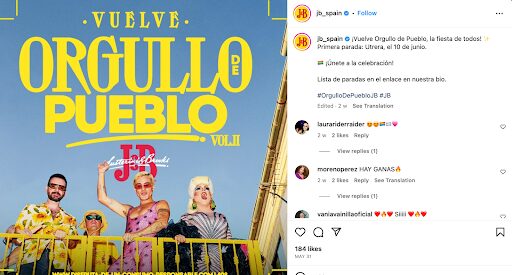
3. Netherlands
NPO 3 FM is a Dutch radio broadcaster who is doing something similar to J&B, bringing Pride events to small towns in the Netherlands. It is sharing the initiative on Instagram and asking people to sign up their own village if it’s not already on the list. Generally, the campaign has been received very well, especially by the LGBTQIA+ community. However, there have been a significant number of negative comments, with people saying this isn’t welcome in their town. Interestingly, the brand has not interacted with any of the negative comments or with the positive ones.
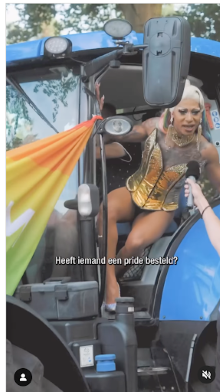
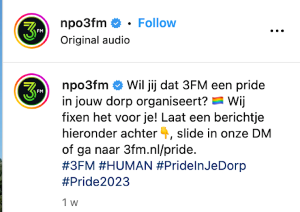
Another brand going beyond performative allyship is WE, a clothing brand based in the Netherlands. We know that consumers want to see brands positively impacting the queer community, and WE are doing exactly that by offering changing rooms to anyone who doesn’t have a safe space to get dressed for Pride. Turning words into real action, and by doing so, the brand is receiving lots of positivity and are promptly engaging with it!
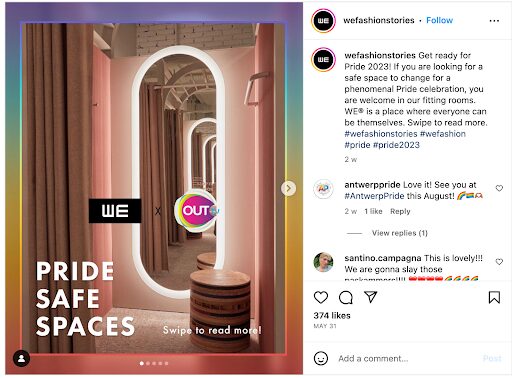
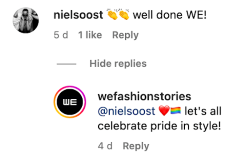
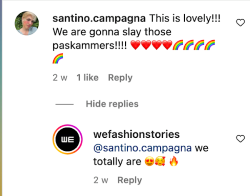
If you’re going to speak up, stand your ground. The Social Element signed the pledge launched by Outvertising along with other agencies to call on brands to continue supporting the LGBTQIA+ community, brave the backlash, take meaningful action and depart from media outlets that spread misinformation.
